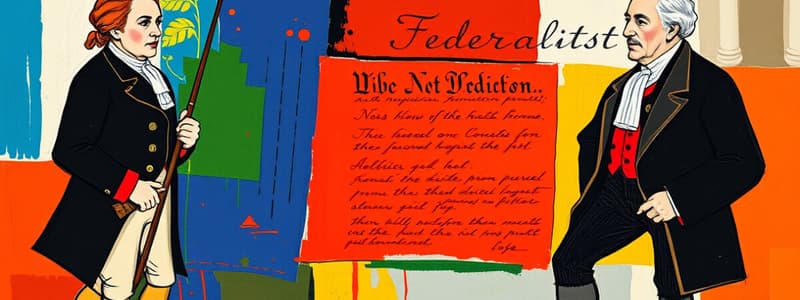Podcast
Questions and Answers
How were Samuel Adams and Thomas Jefferson alike in their position on ratifying the Constitution?
How were Samuel Adams and Thomas Jefferson alike in their position on ratifying the Constitution?
They both opposed a strong federal government.
What did the Anti-Federalists want to do?
What did the Anti-Federalists want to do?
- Refuse to vote on ratifying the Constitution
- Ensure the Bill of Rights was included in the Constitution (correct)
- Convince Federalists to ratify the Constitution
- Ratify the Constitution
What is a faction?
What is a faction?
A group that strongly disagrees with another group.
Which idea does the excerpt from Publius support?
Which idea does the excerpt from Publius support?
What did Anti-Federalists fear would happen if the Constitution became law?
What did Anti-Federalists fear would happen if the Constitution became law?
According to Anti-Federalists, the Constitution could give the president...
According to Anti-Federalists, the Constitution could give the president...
How did Alexander Hamilton and James Madison view the Constitution?
How did Alexander Hamilton and James Madison view the Constitution?
Unlike the Anti-Federalists, the Federalists believed...
Unlike the Anti-Federalists, the Federalists believed...
What does the excerpt from Publius summarize about government?
What does the excerpt from Publius summarize about government?
What best summarizes the point of view expressed in the excerpt from The Federal Farmer?
What best summarizes the point of view expressed in the excerpt from The Federal Farmer?
Flashcards are hidden until you start studying
Study Notes
Federalists and Anti-Federalists Overview
- Samuel Adams and Thomas Jefferson both opposed a strong federal government, reflecting Anti-Federalist sentiments.
- The Anti-Federalists aimed to ensure the inclusion of the Bill of Rights in the Constitution to protect individual liberties.
- A faction is defined as a group that strongly disagrees with another group, often leading to political divisions.
Key Concepts in Governance
- Publius argued for separating lawmaking powers into different branches to prevent abuses; this supports the Federalist view of a divided government.
- Anti-Federalists feared the Constitution would grant Congress excessive power over states, undermining state autonomy.
- Concerns were raised that the new Constitution could potentially give the president too much influence over government affairs.
Perspectives on the Constitution
- Alexander Hamilton and James Madison were prominent Federalist leaders who advocated for the Constitution's ratification.
- Federalists believed the president should have sufficient power to effectively lead the nation, contrasting with Anti-Federalist views on executive power.
Governance and Human Nature
- The necessity of government as a control mechanism reflects the belief that human beings are flawed, as discussed by Publius.
- The excerpt from The Federal Farmer warns that a unified government might threaten individual freedoms and lead to civil unrest, highlighting a key Anti-Federalist concern.
Conclusion
- The debate between Federalists and Anti-Federalists centered on the balance of power between federal authority and state rights, influencing the Constitution's ratification and the political landscape of early America.
Studying That Suits You
Use AI to generate personalized quizzes and flashcards to suit your learning preferences.



